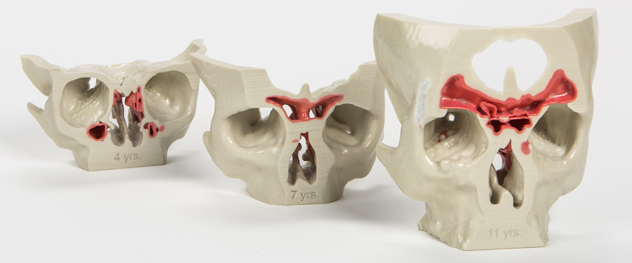
The Division of Rhinology and Skull Base Surgery studies medical and surgical management of the paranasal sinuses and anterior skull base.
Rhinology and Skull Base Surgery
The Mayo Clinic Department of Otolaryngology — Head and Neck Surgery's Division of Rhinology and Skull Base Surgery is committed to investigating novel ways to help treat patients with disease processes and improve their quality of life for diagnoses including:
Researchers aim to provide cutting-edge insights into how these diseases develop and to provide better treatment options. To accomplish these goals, the division works with several Mayo Clinic groups, including specialists in:
- 3D anatomical modeling.
- Allergy and immunology.
- Anatomic pathology.
- Individualized medicine.
- Neurosurgery.
- Ophthalmology.
Researchers also collaborate with colleagues at other leading national academic institutions.
Nearly every patient that comes to the division for consultation for chronic rhinosinusitis, sinonasal or skull base tumors or receives care in Mayo Clinic's Thyroid Eye Disease Clinic can participate in research in one way or another.
Chronic rhinosinusitis
Researchers focused on chronic rhinosinusitis seek to understand why this disease develops and how to better treat it.
In partnership with the Mayo Clinic Division of Allergic Diseases, the Division of Rhinology and Skull Base Surgery is conducting a comprehensive clinical and immunology program focused on chronic rhinosinusitis with nasal polyps and aspirin-exacerbated respiratory disease (AERD, formerly known as Samter triad). Particular areas of interest include T-cell subset differential expression in patients with nasal polyposis and immune profile markers in patients with nasal polyps and AERD.
Given the division's high level of experience treating patients with AERD, researchers have developed several studies specifically for these patients. Ongoing investigations include:
- Translational work to understand the specific immune dysregulation in the nasal polyps of patients with AERD.
- Research to understand the potential for altered blood clotting in these patients.
- Studies on how biomarkers may play a role in evaluating this disease process.
Countless patients come to Mayo Clinic with challenging sinus diseases for which multiple previous surgeries or rounds of medical therapy have failed. As physician-scientists, faculty members in the Division of Rhinology and Skull Base Surgery are deeply invested in helping these patients. They also are focused on improving outcomes and long-term quality of life for patients undergoing endoscopic sinus surgery, especially revision sinus surgery.
The division is involved in several multicenter prospective studies examining outcomes of endoscopic sinus surgery and optimizing patients' quality of life.
Sinonasal and skull base tumors
The division's clinicians treat many patients with benign or malignant tumors located in the sinonasal cavity or anterior skull base. These tumors can be challenging to treat and significantly affect patients' quality of life, as they can cause problems with vision, sense of smell, sensation and nasal function. In response, the Division of Rhinology and Skull Base Surgery has initiated a major research effort to better understand how these tumors develop and how to optimize treatment outcomes.
In collaboration with colleagues in the Department of Neurosurgery, researchers are prospectively evaluating tumor outcomes and quality of life after skull base surgery.
Investigations are focused on understanding factors that affect survival and outcomes in patients with sinonasal cancers, including the genomic and transcriptomic analysis of sinonasal mucosal melanoma and how this affects disease prognosis. Researchers are focused on sinonasal cancers such as esthesioneuroblastoma, mucosal melanoma and adenocarcinoma.
The division also is conducting studies on olfaction after endoscopic skull base surgery, skull base reconstruction and quality of life. Several published and ongoing studies using large national databases have helped researchers better understand factors affecting survival in rare sinonasal malignancies.
In addition, investigators in the Division of Rhinology and Skull Base Surgery frequently collaborate with colleagues at other leading institutions to investigate novel surgical techniques and methods to improve sinonasal outcomes after endoscopic skull base surgery.